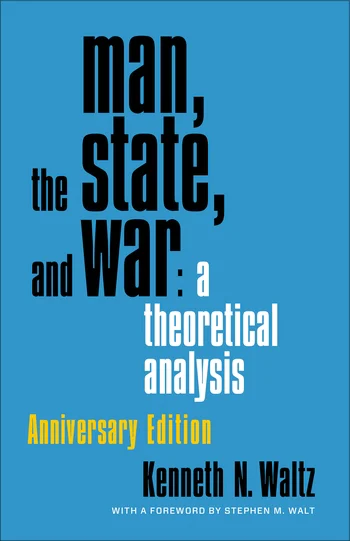
"인간, 국가, 그리고 전쟁: 이론적 분석"은 케네스 N.이 쓴 국제 관계 분야의 고전 책이다. 왈츠는 1959년에 처음 출판되었다. 그것은 그 분야에서 가장 중요한 작품 중 하나로 널리 여겨지며, 국제 관계 이론의 발전에 상당한 영향을 미쳤다.
이 책의 중심 주장은 국제 체제가 국가 행동의 주요 결정 요인이며, 국제 체제의 구조가 전쟁의 가능성을 결정하는 핵심 요소라는 것이다. 왈츠는 국제 체제가 무정부적이라고 주장하며, 이는 규칙을 시행하거나 분쟁을 해결할 수 있는 국가보다 더 높은 권위가 없다는 것을 의미한다. 결과적으로, 국가들은 끊임없이 불안정한 상태에 있으며, 생존을 보장하기 위해 자신의 군사력에 의존해야 한다.
왈츠의 이론은 종종 "신현실주의"라고 불리며, 국가 행동을 형성하는 데 있어 국제 시스템의 중요성을 강조한다. 신현실주의에 따르면, 국가의 행동은 권력과 안보 추구에 의해 주도되며, 국제 시스템은 국가 행동의 주요 결정 요인이다. 국가는 안보와 권력을 극대화하기 위해 자신의 이익을 위해 행동하는 합리적인 행위자이며, 국가의 행동은 국제 체제의 권력 분배에 의해 형성된다.
왈츠는 또한 국제 정치에서 국가의 역할을 강조한다. 그는 국가가 국제 시스템의 주요 행위자이며, 국가의 행동은 발전 수준과 그들이 가진 정부 유형과 같은 내부 특성에 의해 형성된다고 주장한다. 그는 또한 국가 간의 힘의 균형이 갈등의 가능성을 결정하는 핵심 요소라고 주장한다. 한 국가가 너무 강력해지면, 다른 주들은 그것과 균형을 맞추려고 노력할 것이며, 이는 갈등으로 이어질 수 있다.
왈츠 이론의 주요 기여 중 하나는 국가 행동을 형성하는 데 있어 군사력의 중요성을 강조하는 것이다. 왈츠에 따르면, 군사력은 국제 체제에서 안보의 궁극적인 원천이며, 국가는 생존을 보장하기 위해 강력한 군대를 유지해야 한다. 이것은 국가 간의 지속적인 군비 경쟁으로 이어지며, 이는 갈등의 가능성을 증가시킬 수 있다.
전반적으로, "인간, 국가, 그리고 전쟁"은 국제 관계 분야에서 중요하고 영향력 있는 책이다. 그것은 전쟁의 원인과 평화의 조건에 대한 설득력 있는 이론적 분석을 제공하며, 그 분야의 발전에 상당한 영향을 미쳤다. 왈츠의 신현실주의 이론은 널리 논의되고 비판을 받았지만, 국제 관계 연구에서 중요한 관점으로 남아있다.
"Man, the State, and War: A Theoretical Analysis" is a classic book in the field of international relations, written by Kenneth N. Waltz and first published in 1959. It is widely regarded as one of the most important works in the field, and has had a significant impact on the development of international relations theory.
The central argument of the book is that the international system is the primary determinant of state behavior, and that the structure of the international system is the key factor in determining the likelihood of war. Waltz argues that the international system is anarchic, meaning that there is no higher authority above states that can enforce rules or resolve disputes. As a result, states are constantly in a state of insecurity, and must rely on their own military power to ensure their survival.
Waltz's theory is often referred to as "neorealism," and emphasizes the importance of the international system in shaping state behavior. According to neorealism, the behavior of states is driven by their pursuit of power and security, and the international system is the primary determinant of state behavior. States are rational actors that act in their own self-interest to maximize their security and power, and the behavior of states is shaped by the distribution of power in the international system.
Waltz also emphasizes the role of the state in international politics. He argues that the state is the primary actor in the international system, and that the behavior of states is shaped by their internal characteristics, such as their level of development and the type of government they have. He also argues that the balance of power between states is a key factor in determining the potential for conflict. When one state becomes too powerful, other states will seek to balance against it, which can lead to conflict.
One of the key contributions of Waltz's theory is its emphasis on the importance of military power in shaping state behavior. According to Waltz, military power is the ultimate source of security in the international system, and states must maintain a strong military in order to ensure their survival. This leads to a constant arms race between states, which can increase the likelihood of conflict.
Overall, "Man, the State, and War" is an important and influential book in the field of international relations. It provides a compelling theoretical analysis of the causes of war and the conditions for peace, and has had a significant impact on the development of the field. Waltz's neorealist theory has been widely debated and criticized, but it remains a significant perspective in the study of international relations.



